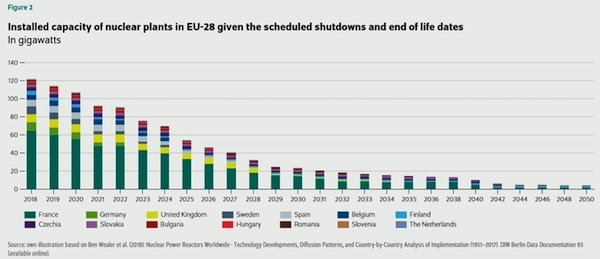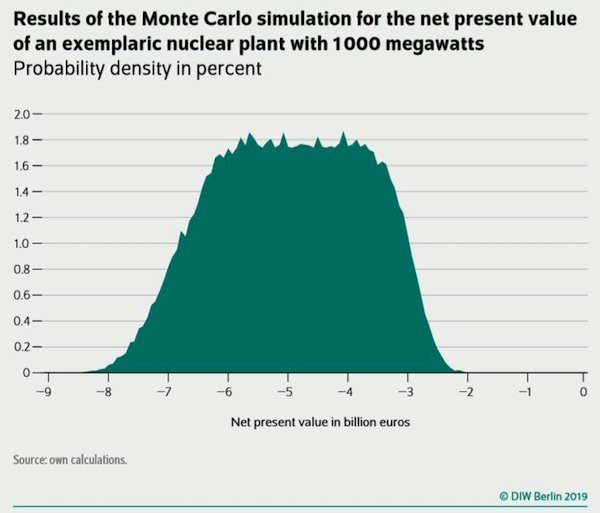
Pablo Picasso Massacre in Korea 1951
It’s been a long time since I wrote anything at all about nuclear energy. And even then I thought the whole discussion had been wrapped up and thrown away. But I guess it’s inevitable that as the climate change debate develops, there’d be parties seeking to revive the nukes ‘discussion’, because there’s so much potential profit in there. And then today I came upon this report, and a few interpretations of it, that set me off again, and brought back the whole Yucca Mountain issue to mind.
Please note that in all that follows, there is ONE very obvious notion to keep in mind: nuclear energy is a huge economic loss-maker, no matter how and where you look.
And that makes nukes, right from the get-go, completely unfit to replace anything fossil-fuel based, because coal and oil and gas are sources that do the opposite: they generate huge profits while nukes generate huge losses, i.e.: you can’t run your economy on nuclear. You can not run an economy on any energy source that generates economic losses. It does NOT get simpler than that. It’s the economics of energy, and for once economics are right (though not economists, name me one who understands this. Hi, Steve!).
Mind you, you can’t run our present complex economies and societies on renewables either, no more than you can run them on nuclear. Much simpler economies, sure, but then you will have to figure out how you’re going to pay for that. It’s hard to comprehend to which extent fossil fuels have shaped our world, but we have no choice but to try, because this is one thing you don’t want to get wrong.
The report comes from the German Institute for Economic Research (DIW Berlin), which studied 674 nuclear power plants built since 1951. Their own abstract says the following:
Nuclear Power Is Not an Option for the Climate-Friendly Energy Mix
The debate on effective climate protection is heating up in Germany and the rest of the world. Nuclear energy is being touted as “clean” energy. Given the circumstances, the present study analyzed the historical, current, and future costs and risks of nuclear energy. The findings show that nuclear energy can by no means be called “clean” due to radioactive emissions, which will endanger humans and the natural environment for over one million years. And it harbors the high risk of proliferation. An empirical survey of the 674 nuclear power plants that have ever been built showed that private economic motives never played a role.
Instead military interests have always been the driving force behind their construction. Even ignoring the expense of dismantling nuclear power plants and the long-term storage of nuclear waste, private economy-only investment in nuclear power plant would result in high losses— an average of five billion euros per nuclear power plant, as one financial simulation revealed. In countries such as China and Russia, where nuclear power plants are still being built, private investment does not play a role either. Nuclear power is too expensive and dangerous; therefore it should not be part of the climate-friendly energy mix of the future.
In other words, nuclear energy is already a huge economic loser even before decommissioning and waste storage are taken into consideration, and those last two costs are by far the largest. So much so that it even makes precious little sense to calculate nuke costs without including decommissioning and waste storage costs. But people do it, and they get paid for that….
A site called Renew Economy, which appears to be Australian, has this comment on the DIW report (they’re one of the few I found that had any comment at all):
Nuclear Energy Is Never Profitable
A new study of the economics of nuclear power has found that nuclear power has never been financially viable, finding that most plants have been built while heavily subsidised by governments, and often motivated by military purposes, and is not a good approach to tackling climate change. The study has come from DIW Berlin, a leading German economic think-tank, and found that the average 1,000MW nuclear power plant built since 1951 resulted in an average economic loss of 4.8 billion euros ($7.7 billion AUD). The report comes amid a hot debate over the future of nuclear power in both Germany and Australia.
The report published by the German Institute for Economic Research (known as DIW Berlin) reviewed the development of 674 nuclear power plants built since 1951, finding that none of the plants was built using ‘private capital under competitive conditions’. “The results showed that in all cases, an investment would generate significant financial losses. The (weighted) average net present value was around minus 4.8 billion euros,” the study says. “Even in the best case, the net present value was approximately minus 1.5 billion euros. The authors included conservative assumptions with high electricity prices, low capital costs, and specific investment. Considering all assumptions regarding the uncertain parameters, nuclear energy is never profitable.”

click to enlarge in new tab
The report authors are also pessimistic about the future of nuclear power, concluding that nuclear power will remain unprofitable into the foreseeable future. Unlike Australia, Germany has a history of nuclear power use, which as recently as 2010, supplied around a quarter of Germany’s electricity. The government led by Angela Merkel has committed to the complete phase-out of nuclear power by 2022. The report found that when nuclear power plants were built using private investment, that “large state subsidies” were used to make the projects viable, and that in most cases, nuclear power stations were built at a loss.
DIW Berlin calculated that for every 1,000 Megawatts of nuclear power capacity that has been built since 1951, there were average economic losses of between 1.5 to 8.9 billion Euros. “Nuclear power was never designed for commercial electricity generation; it was aimed at nuclear weapons. That is why nuclear electricity has been and will continue to be uneconomical. Further, nuclear energy is by no means ‘clean.’ Its radioactivity will endanger humans and the natural world for over one million years,” Christian von Hirschhausen, co-author of the study said.

The DIW Berlin report stressed that governments should not be seduced by claims that nuclear power was a solution to the climate crisis. “Nuclear energy for climate protection” is an old narrative that is as inaccurate today as it was in the 1970s. Describing nuclear energy as “clean” ignores the significant environmental risks and radioactive emissions it engenders along the process chain and beyond,” the report concluded.
Another site called Recharge Transition finds basically the same:
Nuclear Has Never Been Economic And Is Dangerous
Nuclear power is economically unviable, dangerous and should not be labelled as a clean form of energy, the renowned German Institute for Economic Research (DIW Berlin) said, pointing to research it has carried out on the profitability of investments in nuclear power plants. DIW Berlin is one of the leading economic think tanks in Germany. According to “numerous scientific studies,” none of the world’s more than 600 nuclear power stations have ever been economically viable, and the plants could only be operated for years due to government subsidies, the institute claims.
“That nuclear energy has never been economically competitive comes as no surprise as electricity production has always only be a by-product. Military and geo-strategical interests have always come first and this energy source has been massively subsidised,” the study’s author Christian von Hirschhausen said. “Now it is also certain that it won’t be profitable in the future either to invest in atomic energy – neither in new nuclear power plants, nor in the extension of existing ones. “If in addition you consider that nuclear power absolutely isn’t safe, the fairy tale of a climate friendly alternative to fossil energy sources completely collapses.”
And you know what’s “funny” is that as mentioned before, the report never even talks about decommissioning and storage. For me, this was a closed topic, got it, move on. But I looked it up anyway. I couldn’t remember the dates the judge had set. I knew he had thrown out the EPA’s 10,000 years for guaranteed storage safety.
10,000 years is already way beyond man’s powers to guarantee anything at all, it’s pure hubris. According to YuccaMountain.org, the latest a judge mentioned is at least 300,000 years. You know, half-life and all that. I didn’t remember if it was 100,000 or 1 million, and it makes no difference at all, man can make no claim of being capable of doing either, or even 10,000.
On July 9, 2004, the Court of Appeals ruled on Nevada’s Yucca Mountain Lawsuits. The judges dismissed almost all of the State’s claims except a key challenge against the Environmental Protection Agency (EPA). The Court ruled that the EPA’s 10,000-year safety standard on radiation containment at the site was arbitrary and inconsistent with the congressionally-mandated recommendations of the National Academy of Sciences. The Court also struck down the Nuclear Regulatory Commission’s licensing standards insofar as they include a 10,000 year compliance limit.
The National Academy of Sciences said the radiation safety standard should be set at a higher limit, when the waste would be at its peak radiation levels – at least 300,000 years from the time the waste is sent to Yucca. The EPA was required by law to base its rule on NAS’ recommendation, but chose to set the standard at 10,000 years instead.
[..] State officials believe the ruling will significantly delay or even scrap the project. State Attorney General Brian Sandoval claimed a sound victory for Nevada, saying that the EPA would have to form a new rule with a tougher standard – a standard the Energy Department would not be able to meet due to Yucca Mountain’s inferior geology. This “is a fatal blow to the repository ,” Sandoval said. DOE itself has expressed doubts in the past about being able to meet a longer time limit. As quoted by the Court, former project director Lake Barrett wrote in 1999 that a safety standard significantly longer than 10,000 years would be “unworkable and probably unimplementable.”
Yeah, there are dozens of nuclear plants either under construction or in planning phases as we speak. We are told to see Chernobyl and Fukushima as unfortunate accidents, and there are plenty nuclear plants that never have accidents like those, but even then they are all of them gigantic economic loss-makers, and that’s before decommissioning and waste storage, which generate additional behemoth financial losses, and in the end are incapable of solving the problems they themselves generate. It’s all exclusively about profit, damn humans or other lifeforms, and damn the torpedoes.
And the little green Martians out there in space somewhere are watching us saying ”A potentially smart species. Too bad they’re doomed by their own ultimate hubris. But why would they volunteer to nuke their offspring?”
One more time: you can not run an economy on an energy source that generates economic losses. It is NOT an option. Our present economies have been made possible by fossil energy sources that gave us 10-100 times more energy than we put in to extract them. Those days are over. Please adjust your lifestyles accordingly.










Home › Forums › Nuclear Energy, the Ultimate Hubris